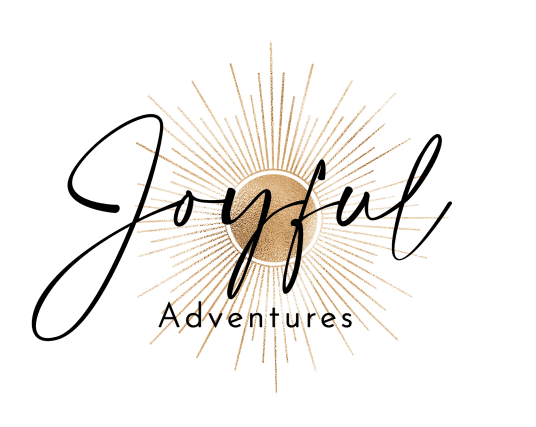The ocean is a beautiful and fascinating place to immerse oneself to explore the clear water and see marine life. Life underwater is colorful and so different from our lives on land. We are fortunate to be able to experience it through diving and snorkeling. Almost anybody can be a snorkeler or diver! Here is a clear guide to help you choose if you put on a snorkel or gear up for a dive.
Diving and Snorkeling
Choosing between diving and snorkeling often depends on your experience level, personal taste, and how deep you want to go into your underwater exploration. If you prefer a laid-back, easy-going observation close to the surface, snorkeling is your best bet. But if you are drawn to the depth, intricacies, and the thrill of the deep blue, diving is the way to go. Both provide incredible views and experiences.
Snorkeling
Snorkeling stands out as the simplest way to witness the underwater world without extensive training or equipment. Snorkeling is swimming near the water’s surface, usually in shallow water. Snorkeling allows you to witness wildlife in it’s natural habitat. Watching a turtle slowly chopping on some coral or sea grass, unfazed by the presence of a snorkeler is so special. Similarly, seeing a reef shark cruise by, or a school of brightly colored fish, or watching an octopus move over a rock, snorkeling opens a whole new world to us.
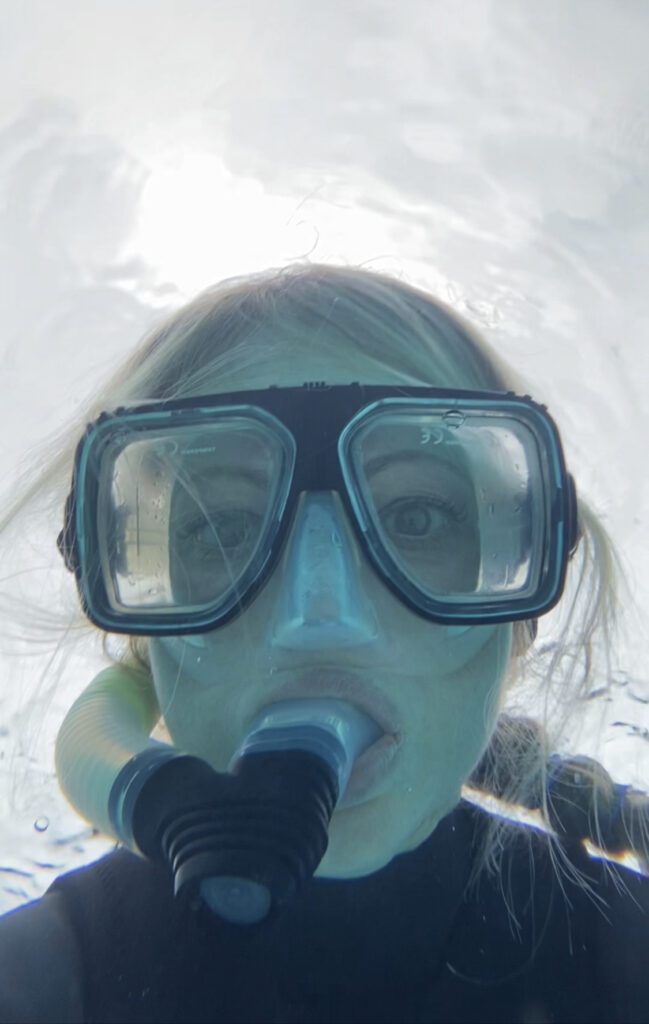
Snorkeling Equipment: All you need is a mask, a breathing tube, called a snorkel, and a pair of fins on your feet to help propel you through the water. Fins provide greater control and maneuverability in the water, allowing you to make quick turns and sudden movements without expending too much energy. The mask helps you see clearly and comfortably underwater. It is important to note that glasses do not fit under masks so contact lenses or a prescription mask will be necessary for those with impaired vision. Optional gear is a wetsuit for cooler water, and either a rash guard or reef safe sunblock to protect your skin. A wetsuit also makes you more bouyant helping you float with ease.
The ease of floating and breathing through your snorkel means you can relax and enjoy the colorful fish and coral at your leisure. Plus, snorkeling is perfect for families, casual adventurers, and those looking to combine
swimming with the beauty of underwater life. Also, no formal training is needed so it is very beginner friendly. I do recommend that snorkelers be proficient swimmers. However, even those less confident in the water can wear a life vest or hold onto a flotation device.
Snorkeling Pros:
- Accessibility: Easy to learn and suitable for all ages. Plus, you can repeatedely go into and out of the water as often as you like. Requires little advanced planning.
- Cost: Inexpensive compared to scuba diving and free diving.
- Safety: Generally safer and less physically demanding.
Snorkeling Cons:
- Limited View: Restricted to shallow waters, so the view is not as extensive as with diving.
- Duration: Limited to the surface, with no ability to explore deeper underwater.
- Surface Conditions: Snorkeling can be affected by waves and surface conditions, which can impact visibility and comfort.
Free Diving
Free diving is diving without the use of an external breathing apparatus. Instead, divers hold their breath until they resurface. Consider this method if you enjoy snorkeling and like the idea of extending your time underwater. Necessary gear is a mask and fins. I usually wear a wetsuit and recommend one for warmth and sun protection. A weight belt will be necessary if you chose to wear a wetsuit. This is because the human body naturally floats, and wetsuits make our bodies even more buoyant. Freediving weight belts are belts that hold weights around your waist. They are used to counteract the buoyancy of the air in our lungs, wetsuit thickness, body composition, and salinity of the water. They help you descend underwater.
Training and Safety
Training for free diving focuses on enhancing lung capacity, improving breathing techniques, and learning to conserve oxygen while diving deep. Safety is paramount in free diving, and it is essential to dive with a buddy and under the supervision of professionals. It is important to be aware that free diving is potentially dangerous if done incorrectly. It requires training, concentration, and technique. Freediving is not something to just go out and try by yourself.
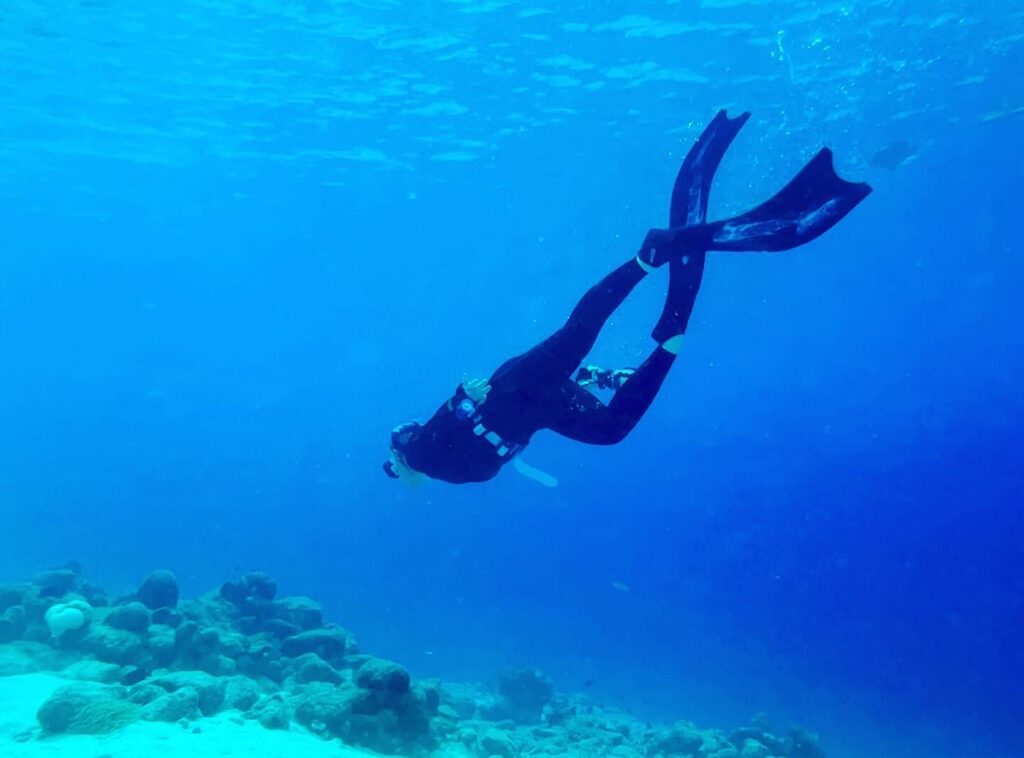
Freediving Pros:
- Experience: Freediving offers a serene and silent way to experience the underwater world since there are no bubbles or equipment noise.
- Cost: Less expensive than scuba diving since there is no need for tanks and other gear.
- Freedom: Offers a greater sense of freedom and connection with the ocean. Plus, you reach deeper depths than snorkeling.
Freediving Cons:
- Limited Time Underwater: The duration of a dive is limited to the diver’s ability to hold their breath.
- Physical Demands: Requires significant physical conditioning and breath control.
- Depth: Dives are typically shallower compared to scuba diving.
- Risk: Freediving can be dangerous if not done correctly.
If you are curious about Freediving then check out these Freediving certification agencies: AIDA (Association International Association for the Development of Apnea), PADI (Professional Association of Diving Instructors), Molchanovs, and SSI (Scuba Schools International). They all offer excellent training programs with unique approaches and strengths. When deciding, consider factors such as course structure, instructor qualifications, global recognition, and community resources. I recently became certified in Freediving through PADI and I highly recommend their program. It was comprensive, safety focused, a challenge, and fun.
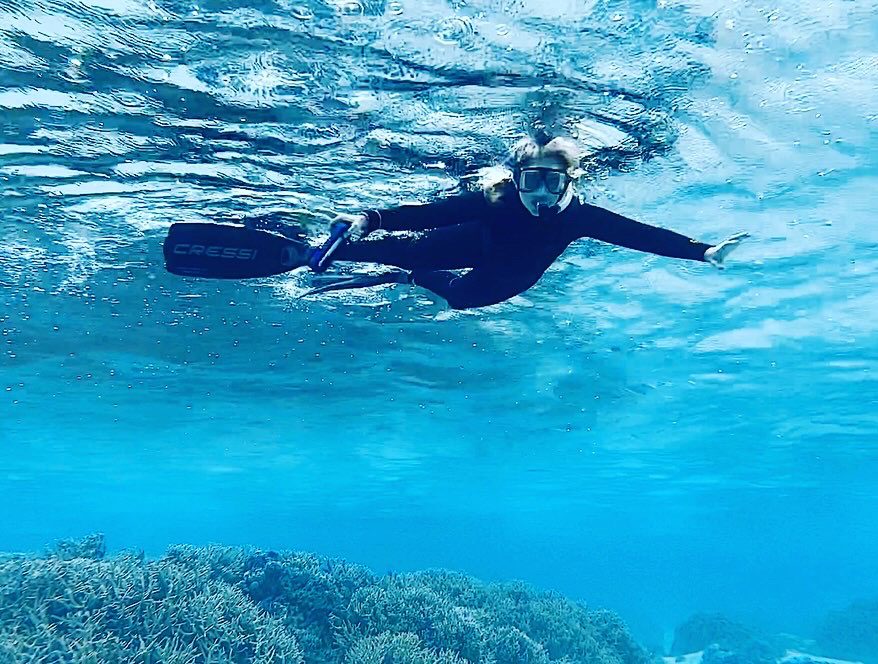
Scuba Diving
Scuba divingis a method of underwater diving where divers use a self-contained underwater breathing apparatus (scuba) to breathe underwater. This specialized gear takes you deeper into the marine world allowing you to explore deeper reefs, shipwrecks, and underwater caves far beyond the reach of sunlight. Diving equipment allows divers to stay submerged for extended periods, exploring depths that are otherwise unreachable. Scuba divers can explore depths up to 130 feet (40 meters) with a basic certification, and deeper with advanced training. Proper training is essential for scuba diving. Divers must complete a certification course that covers the basics of diving, safety protocols, and emergency procedures. This ensures you know how to handle the equipment and understand safety procedures.
Scuba Diving Equipment
This activity requires much more equipment than snorkeling. Specifically, the necessary gear is a diving mask, snorkel, fins, a buoyancy control device (BCD), a scuba tank, a regulator, weights to keep you underwater, and wetsuit or drysuit depending on water temperature. The tank and regulators provide you with air. The tank is filled with pressurized air. The regulators then feed you the air at the right pressure in order to comfortably breathe underwater.
Family Friendly
Almost anybody can become a scuba diver. However, you need to be relatively fit and healthy with no heart or lung issues. Depending on the diving destination, the minimum age for scuba diving varies between 12 and 18 years old. Younger children can choose from a variety of specialty courses so the entire family can enjoy scuba diving.
Scuba Diving Pros:
- Extended Time Underwater: With a tank of compressed air, divers can stay underwater for longer durations, allowing for more thorough exploration.
- Depth Exploration: Scuba diving provides the ability to reach greater depths, offering a wider range of underwater sights and experiences.
- Marine Life Encounters: Divers often get the chance to see a diverse range of marine life up close and species that stay in deeper water.
Cons:
- Cost: Scuba diving equipment and certification courses can be expensive.
- Preparation: Requires more training and physical fitness than snorkeling. You need to undergo formal training to scuba dive.
- Risk: There are inherent risks, such as decompression sickness and equipment malfunctions, though these can be mitigated with proper training and precautions. Scuba diving is considered low risk If you receive the correct training and adhere to recommended safety procedures.
- Flight Restrictions: You need to 18-24 after a dive before you fly in an airplane.
Scuba Diving Certification
There are many diving schools around the world. However, PADI (Professional Association of Diving Instructors) is the largest, most well known, and they have an excellent reputation. The training includes classroom instruction and time in the pool, becoming familiar with setting up the equipment and getting comfortable with spending time underwater. You will receive an Open Water Diver Certification upon completion of the course, which means you are ready to start diving.
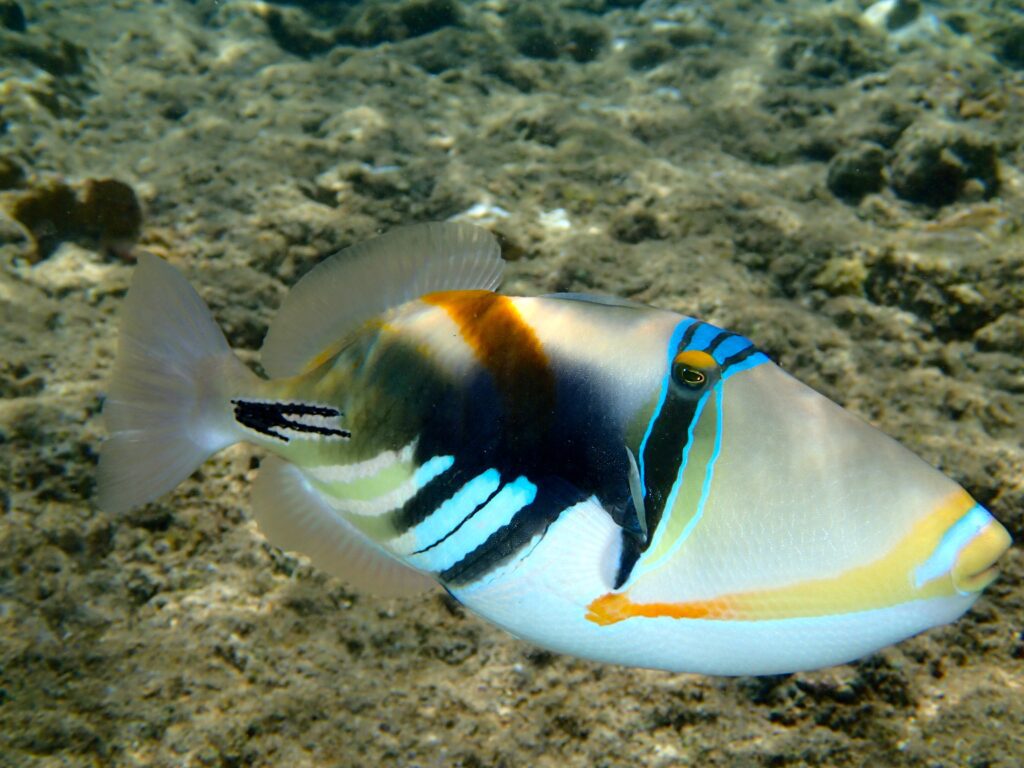
Conclusion
Three great choices! Each method of underwater exploration—scuba diving, free diving, and snorkeling—offers unique experiences and caters to different levels of adventure and skill. Scuba diving allows for deep and prolonged exploration, free diving provides a minimalist and serene experience, and snorkeling offers an easy and accessible way for all ages to observe the underwater world. By understanding the pros and cons of each, you can choose the best method that suits your preferences and abilities for an unforgettable underwater adventure.
Some of my favorite snorkeling destinations have been French Polynesia, Hawaii, and the Caribbean. All three locations have clear beautiful water with abundant marine life in shallower water. Plus, many of the islands in French Polynesia are surrounded by a lagoon, which keeps the water calm. Snorkeling in rough water is not very much fun. Some of my best snorkeling experiences have been in calm, protected coves and lagoons, or around piers or shallow wrecks. I have enjoyed diving in both Hawaii and the Caribbean due to clear visibility and interesting marine life to see. There are so many incredible destinations for underwater adventures. So choose your exploration style, get ready, and have fun! I hope you enjoy diving and snorkeling in our beautiful oceans.
